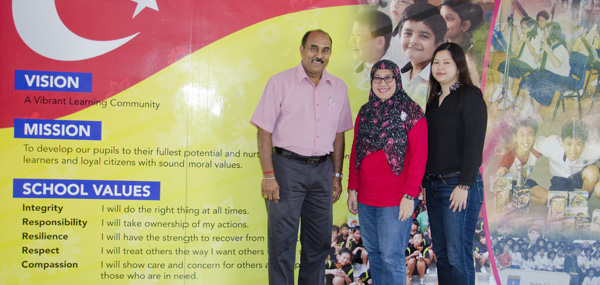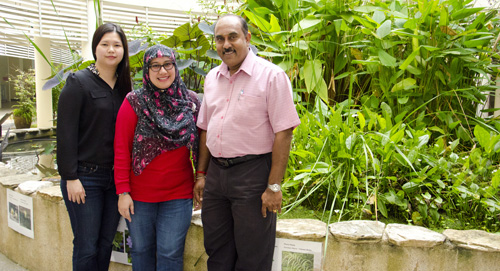Young Children’s Voices in Mathematical Problem Solving
Contributed by Dr Ho Siew Yin and Sng Wei Qin Abbie, from NTUC First Campus, for SingTeach Virtual […]
Read More
Many teachers seek to improve their teaching through critical reflection and dialogue in a professional learning community. In working with an academic researcher, teachers in Bedok Green Primary School found their conversations evolving into something more.

(From left) Pasupathy Magesvaran, Norashinah Mohd Yusope and Angeline Ong feel that research helps grow as teachers
The 21st century brings many new opportunities as well as challenges, and a teacher has to constantly adapt to changes.
“It’s good for teachers to continually learn and to be up to date with current pedagogical practices out there,” notes Mrs Angeline Ong, the Level Head of Math at Bedok Green Primary School.
She is part of the school’s professional learning community (PLC) of upper primary teachers who meet weekly to reflect on their teaching experiences. Their sharing, in turn, helps improve their classroom practices.
Mr Mohd Ridza Hashim, the Primary 6 Head, explains that teachers share their different teaching approaches during the PLC sessions: “Because we all have our own ways of teaching, it’s a good platform to learn from one another.”
Even as the reflection and dialogue within the PLC were taking place, School Staff Developer Mdm Norashinah Mohd Yusope felt that something else was needed to take their conversations onto another level.
“We thought we also would like to really understand, as Angeline said, what is happening out there, what is the latest pedagogy,” she explains.
They saw elements of research, such as literature reviews and collection of data, as something that might open up their horizons when it comes to teacher learning.
“We want teachers to make informed decisions about the classroom practices. Because we’re also looking at the sustainability of students’ outcomes and not just go by gut feel and say that, ‘This worked for my class this year and therefore, next year I will use the same thing.'”
When Dr Hairon Salleh from NIE approached them to participate in a research study on PLCs in early 2013, they seized the opportunity.
We want teachers to make informed decisions about the classroom practices.
– Angeline Ong, Bedok Green Primary School
“Hairon looks at the kind of professional discourse that we have during our sessions and how it can help teachers improve their classroom practices, and eventually translate into positive student learning outcomes,” Norashinah says.
Instead of being an impassive observer of their PLC activities, Hairon decided to add to them by sharing relevant literature reviews with the teachers. He also helped them refine their research questions to better understand the effectiveness of the concrete-pictorial-abstract approach in helping Primary 5 pupils acquire Math concepts.
Hairon’s team also administered four Math diagnostic tests to the pupils over the course of the year to determine which are the topics students struggle with. Using the data collected from the tests, he discussed with the teachers how they might teach these topics more effectively.
The teachers are especially appreciative of the insights gained from the statistical analysis by Hairon’s team on the data collected.
Prior to the collaboration, the teachers do collect their own data by tracking students’ daily work and their examination results. “But we all know that by just looking at raw data, it doesn’t tell you much about the impact of teaching and learning,” Norashinah says.
“Statistics may not be everyone’s cup of tea,” says Angeline, “but what’s really useful is how the researchers help to bring the numbers down to our level and teach us how to study and understand the data.”
Primary 5 teacher Mr Pasupathy Magesvaran agrees, and recalled how the researchers conducted a Rasch analysis to show teachers a breakdown of each student’s score and how they performed.
“As teachers, we can then go back to class and do re-teaching and re-mediation on those particular questions of certain topics that they are weak at,” he says.

Statistical knowledge and data are definitely useful, but Angeline shares that Dr Hairon’s most valuable contribution to their learning in steering them towards the kind of professional discourse that helps them grow as teachers. For one, he often asks them critical questions that made them think deeper.
“Ever so often, he brings us back to the question which we as practitioners may forget along the way because of time constraints. He will ask us, ‘Why do you think pupils think in this manner? Why are they doing this?'”
To find out what pupils are thinking, Hairon showed them how qualitative research methods, such as interviews, could be the way to go.
The teachers admit that they used to focus more on the quantitative research, because they’re interested in results. “I think what this whole collaboration really opened up our eyes to how qualitative data can be even richer and how we can make use of it as a feedback to our own teaching pedagogy,” Norashinah professes.
“We make a more conscious effort to bring the pupil over and ask, ‘Can you explain how you did this, and why did you choose to do this?'” Angeline says. “And when we bring these qualitative data down to the PLC discussions, it generates a lot of ideas and helps us to think about how to structure our lessons to better cater to the students.
For teachers who are research practitioners, they think about the kind of students they have, and then look at how they can then adapt their teaching and learning in order to impact that group of students
– Norashinah Mohd Yusope, Bedok Green Primary School
It is understandably not easy for teachers to embark on research because of time constraints.
However, now that they are exposed to the research process and saw first-hand how research ultimately results in positive learning outcomes, the teachers recognize its importance in terms of their professional development.
Norashinah compares it with attending workshops and points out that certain strategies taught in workshops are generic and do not account for the diverse student profiles in classes.
“For teachers who are research practitioners, they think about the kind of students they have, and then look at how they can then adapt their teaching and learning in order to impact that group of students,” she says. “And it is very meaningful for teachers because they are re-looking at their classroom practices every day.”
In reflecting about how research has developed her as a teacher, Norashinah offers her thoughts: “Research has no ending. You can keep researching and get better at doing things, or look for possibilities of doing things that are better. But if you attend workshops, how do you make it better? If it doesn’t work, who do I ask? So I think you need to be a researcher if you’re a teacher.”